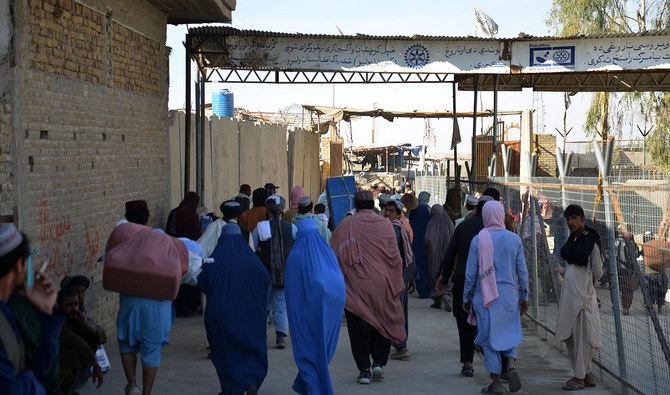QUETTA: Afghanistan’s Taliban authorities have vowed to address all problems, including the issue of border clashes with Pakistani forces, through dialogue, a Taliban official said, more than a week after Islamabad said skirmishes at the Chaman border crossing killed eight Pakistani civilians.
Since the Taliban took over Afghanistan in August 2021, many deadly clashes have taken place between the Pakistani and Afghan border forces, while militants from the Afghan side of the border have attacked Pakistani security forces in separate incidents.
The assurance by the Afghan Taliban came after a 14-member Pakistani delegation, comprising religious scholars, tribal elders and traders from the southwestern Balochistan province, visited Afghanistan’s Kandahar province on Monday to discuss border tensions with the Afghan defense and foreign ministry representatives.
Afghanistan and Pakistan have both traded blame over the clashes that erupted on December 11, while Islamabad summoned the Afghanistan’s chargé d’affaires to issue a “strong condemnation” over the skirmishes a day later.
“We always want to resolve problems through dialogue, our forces have taken steps to defend the motherland,” Hajji Attaullah Zaid, a spokesman for the Kandahar governor’s office, told Arab News.
“Pakistan’s scholars, and businessmen said we should consider this problem as our own. We expressed seriousness. The government and the delegation of the Islamic Emirate of Afghanistan gave them full assurance that we will never raise the issue of starting a war.”
Pakistan shares a 2600-kilometer long, porous border with Afghanistan and deadly clashes have erupted between the two border forces in the southwestern Balochistan province in the past few months.
The clashes on December 11 claimed lives of eight Pakistani civilians and injured several others, according to Pakistani authorities. Similar skirmishes along the southwestern border wounded 16 Pakistanis on December 15.
In November, Pakistan had closed its Spin Boldak-Chaman border crossing for eight days after an Afghan national had attacked and killed a Pakistani paramilitary soldier. The border crossing was reopened after the Taliban authorities assured Pakistan of bringing the suspect to justice.
Pakistan’s federal and provincial government officials did not respond to multiple messages and calls by Arab News for a comment on the story.
Qari Muhammad Aslam, a religious scholar who led the Pakistani delegation in Kandahar, said discussions with Afghan defense and foreign ministry representatives were held in a “very friendly environment.”
“Today a flag meeting between the Pak-Afghan border officials was held at the Chaman-Spin Boldak Friendship Gate and both the countries agreed to pave the way for peace,” Aslam told Arab News.
Hajji Imran Kakar, a leading trader in Chaman who was part of the Pakistani delegation, said they had received a “positive response” from the Afghan side.
“They assured us that, in future, all border issues would be resolved through dialogue,” Kakar told Arab News.


















